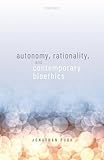Autonomy, rationality, and contemporary bioethics / Jonathan Pugh.
Material type: TextSeries: Oxford philosophical monographsPublisher: Oxford, United Kingdom ; New York, NY : Oxford University Press, 2020Edition: First editionDescription: x, 287 pages ; 24 cmContent type:
TextSeries: Oxford philosophical monographsPublisher: Oxford, United Kingdom ; New York, NY : Oxford University Press, 2020Edition: First editionDescription: x, 287 pages ; 24 cmContent type: - text
- unmediated
- volume
- 9780198858584
- 0198858582
- 174.2 23 PUG
- R725.5 .P84 2020
- WB 60
| Item type | Current library | Call number | Status | Date due | Barcode |
|---|---|---|---|---|---|
| Books | SUN - Main Library General Shelves | 174.2 PUG (Browse shelf(Opens below)) | Available | 2024-0057 |
Includes bibliographical references and index.
Introduction -- 1: Four Distinctions Concerning Rationality -- 2: Rationality and Decisional Autonomy -- 3: Controlling Influences -- 4: Coercion -- 5: The Practical Dimension of Autonomy -- 6: Informed Consent, Autonomy, and Beliefs -- 7: Rational Autonomy and Decision-Making Capacity -- 8: Rational Decision-Making Capacity in End of Life Decision-Making -- 9: The Prudential Value of Autonomy -- Concluding Remarks -- Bibliography -- Index.
This is an open access title available under the terms of a CC BY-NC-ND 4.0 International license. It is free to read at Oxford Scholarship Online and offered as a free PDF download from OUP and selected open access locations. Personal autonomy is often lauded as a key value in contemporary Western bioethics. Though the claim that there is an important relationship between autonomy and rationality is often treated as uncontroversial in this sphere, there is also considerable disagreement about how we should cash out the relationship. In particular, it is unclear whether a rationalist view of autonomy can be compatible with legal judgments that enshrine a patient's right to refuse medical treatment, regardless of whether the reasons underpinning the choice are known and rational, or indeed whether they even exist. Jonathan Pugh brings recent philosophical work on the nature of rationality to bear on the question of how we should understand personal autonomy in contemporary bioethics. In doing so, he develops a new framework for thinking about the concept of autonomy, one that is grounded in an understanding of the different roles that rational beliefs and rational desires have to play in it. Pugh's account allows for a deeper understanding of d the relationship between our freedom to act and our capacity to decide autonomously. His rationalist perspective is contrasted with other prominent accounts of autonomy in bioethics, and the revisionary implications it has for practical questions in biomedicine are also outlined.-- Source other than the Library of Congress.

There are no comments on this title.